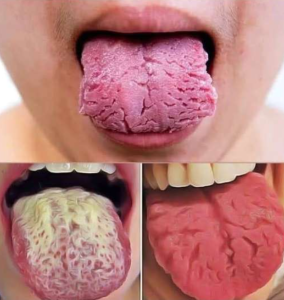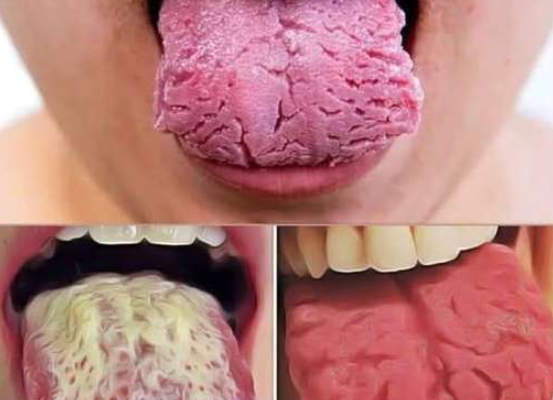“What the Tongue Tried to Tell Her”
The first time Dara noticed her tongue was dry and cracked, she dismissed it as dehydration. Cambodia’s heat was relentless, and she’d spent the day walking through the dusty lanes of Siem Reap, guiding tourists through ancient temples with the practiced ease of someone who knew every stone by heart. She drank water, chewed gum, and moved on.
But the cracks deepened.
By the end of the week, her tongue felt like parchment—dry, brittle, and strangely numb. She caught glimpses of it in the mirror, startled by its pale, fissured surface. It looked like something out of a medical textbook, not part of her own body. Then came the white coating, thick and stubborn, like frost on a windowpane. Her breath soured, her appetite waned, and her voice—once warm and melodic—grew hoarse.
She didn’t tell anyone.
In Cambodia, illness is often endured quietly. Dara’s mother had taught her that strength meant silence, and that complaining was a luxury reserved for the wealthy. So she kept working, kept smiling, even as her tongue felt like it was rotting inside her mouth.
It wasn’t until a tourist—a nurse from Canada—pulled her aside that Dara began to understand the gravity of her condition.
“You need to see a doctor,” the woman said gently, handing Dara a small mirror. “This could be oral thrush. Or something worse.”
Dara stared at her reflection. Her tongue was coated in white, like it had been dipped in chalk. The cracks were deeper now, and the edges looked inflamed. She nodded, thanked the woman, and promised to seek help.
But she didn’t.
Instead, she went home and boiled lemongrass, ginger, and turmeric—her grandmother’s cure-all. She swished salt water, chewed cloves, and prayed. The symptoms persisted. Her tongue became a battlefield—dryness, pain, and shame warring for dominance. She stopped eating solid food. Her words slurred. Her confidence eroded.
One night, she dreamt her tongue fell out.
In the dream, she held it in her hands, staring at its lifeless form. It was cracked like dry earth, coated in white, and pulsing faintly. She woke up crying, her mouth aching, her pillow damp with sweat.
That morning, she finally went to the clinic.
The doctor—a young man with kind eyes—examined her tongue and frowned. “You have candidiasis,” he said. “A fungal infection. It’s common, but yours is advanced. We’ll need to treat it aggressively.”
Dara nodded, tears slipping down her cheeks. She wasn’t afraid of the diagnosis—she was afraid of what it represented. Her body had been trying to speak to her for weeks, and she hadn’t listened.
The treatment began.
Antifungal medication, dietary changes, and rest. Dara stopped working, stopped guiding tourists, and stayed home. Her mother fussed over her, boiling soups and massaging her feet. Her siblings whispered, worried but unsure how to help. Slowly, the white coating faded. The cracks softened. Her voice returned.
But something had shifted.
Dara began to see the tongue not just as a muscle, but as a messenger. It had warned her, pleaded with her, and finally screamed. She started reading about oral health, learning how the tongue could reveal everything from vitamin deficiencies to autoimmune disorders. She became obsessed with the idea that the body speaks in symbols, and that illness is a language waiting to be translated.
She began volunteering at a local health center, helping others recognize the signs their bodies were showing. She taught children how to brush their tongues, how to spot abnormalities, and how to speak up when something felt wrong. Her own experience became a story she shared often—sometimes with humor, sometimes with tears.
One day, a young girl came to the clinic with a tongue that looked eerily familiar—dry, cracked, and coated in white.
Dara knelt beside her, held her hand, and said, “I know what this feels like. You’re not alone.”
The girl stared at her, eyes wide. “Will it go away?”
“Yes,” Dara said. “But you have to listen to your body. It’s telling you something important.”
That moment stayed with her.
She realized that healing wasn’t just about medicine—it was about attention, compassion, and the courage to confront discomfort. Her tongue had been a mirror, reflecting not just physical illness but emotional neglect. She had ignored herself for too long, and the consequences had been written in white and red across her mouth.
Years passed.
Dara’s tongue healed, but her mission deepened. She became a health educator, traveling to villages and schools, teaching people how to read the signs their bodies offered. She carried a small mirror, just like the one the Canadian nurse had given her, and used it to show others what they couldn’t see.
Her story became legend in her community—a tale of a woman who lost her voice but found her purpose. And every time she looked in the mirror, she saw not just a healthy tongue, but a reminder: the body speaks. We must learn to listen.

